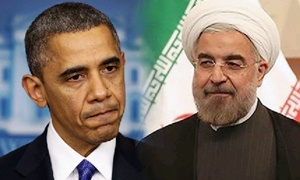Markets cheer as Iran, West clinch nuclear deal
14 Jul 2015
Iran and the US-led big six western powers reached a nuclear deal on Tuesday, ending more than a decade-old sanctions that have crippled the once thriving oil economy of the Islamic Republic.

Markets cheered and the oil prices declined further as a sanctions-free Iran raised the prospects of a spurt in global oil supplies.
Under the deal, reached after a decade of on-off negotiations, United States, European Union and United Nations would lift sanctions in return for Iran agreeing to long-term curbs on a nuclear programme that the West has suspected of being aimed at creating a nuclear bomb.
The deal came after 18 days of intense and often fractious negotiation.
The accord will keep Iran from producing enough material for a nuclear weapon for at least 10 years and impose new provisions for inspections of Iranian facilities, including military sites.
Under the final agreement, Iran had accepted a "snapback" mechanism, under which some sanctions could be reinstated in 65 days if it violated the deal, Western negotiators said.
For Iran, however, the end of sanctions could bring a rapid economic boom by lifting restrictions that have drastically cut its oil exports and hurt its imports.
The prospect of a deal has already helped push down global oil prices because of the possibility that Iranian supply could return to the market.
The agreement could potentially change the economic equations of the Middle East with Iran emerging as the new growth centre, but Israel called the agreement a "historic surrender".
The benefits of the agreement and the subsequent lifting of economic sanctions will bring immense benefits to the Iranian people and the mood in Tehran was upbeat with talks spanning everything from cheaper iPhones to vegetables.
The Iranian rial could be a major gainer and its value gain against international currencies would help push inflation down, and in the very short term. People will feel relieved of the economic pressures that had pinned them down so far.
While the benefits of the agreement will immediately trickle down to the common people by way of cheaper fruits or a range consumer goods like smart phones to choose from, big business will have to wait until the most important of sanctions are lifted.
Once Iran is able to derive the full benefits of the agreement, Iran's oil and gas sector will be able to renew its outdated technologies and Iran's oil production would increase the government's revenue, which in turn would help fix the country's infrastructure.
Western companies and venture capitalists will stream in, bringing more jobs and competition, something the Iranian market and the Iranian consumer has not experienced since the 1970s.
In a way, it was the pragmaticism of Iran's President Hassan Rouhani and President Barack Obama that made reaching an agreement possible, which two years ago seemed a remote prospect.
While Rouhani had vowed to reduce the diplomatic isolation of his 77 million-strong country, Obama had ruled out another war in West Asia.
Both leaders, however, face criticism from sceptics and powerful hardliners at home and abroad after the two sides ended decades of enmity.
Israeli Prime Minister Benjamin Netanyahu called the deal "a bad mistake of historic proportions."
"Iran will get a jackpot, a cash bonanza of hundreds of billions of dollars, which will enable it to continue to pursue its aggression and terror in the region and in the world," he said. "Iran is going to receive a sure path to nuclear weapons."
Israeli deputy foreign minister Tzipi Hotovely called the deal a "historic surrender" and said Israel would "act with all means to try and stop the agreement being ratified," a clear threat of blocking it in the Republican-controlled US Congress.
Congress has 60 days to review the deal, and if it votes to disapprove of it, Obama can veto the rejection. It would then require two thirds of lawmakers to override such a veto.

















